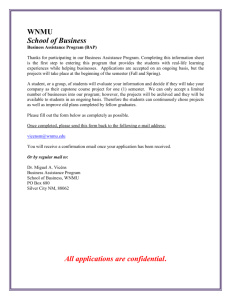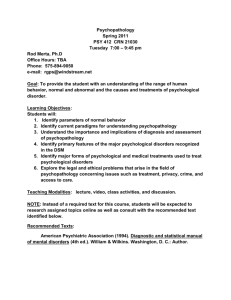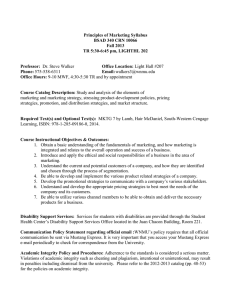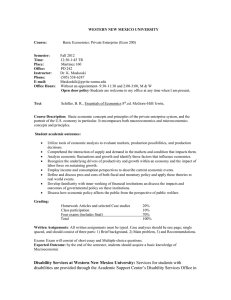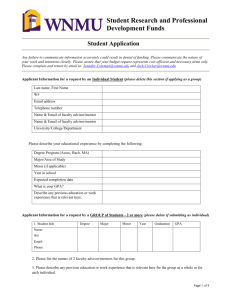SWK 621 CRNs 10776 10577 10574 10572 Terrazas
advertisement
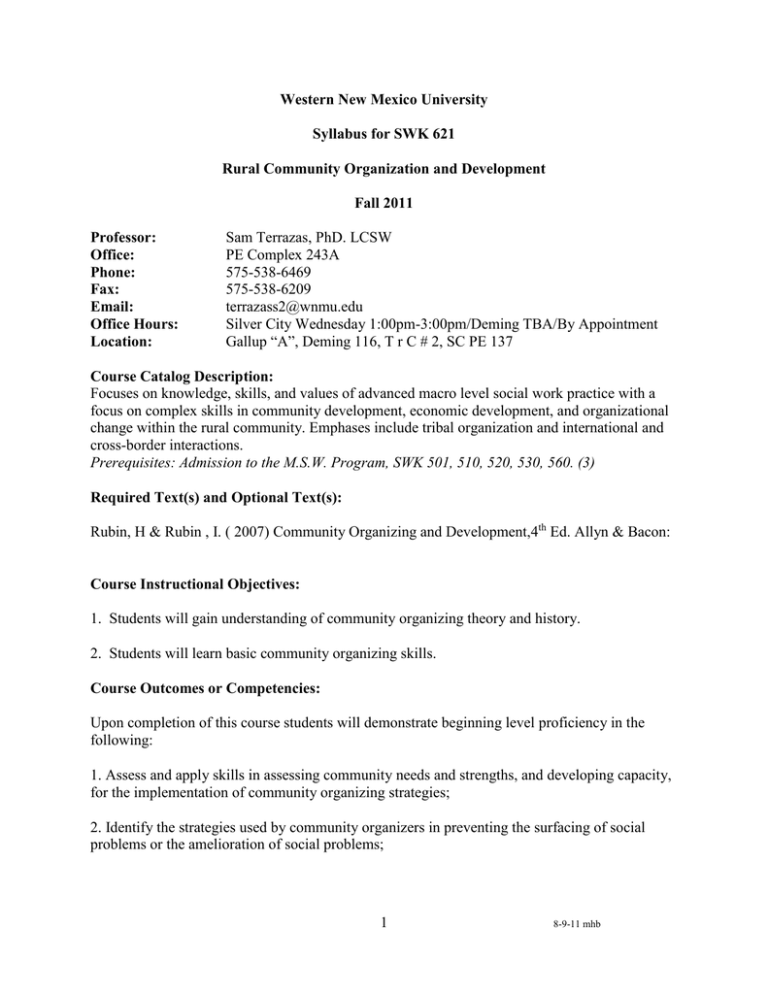
Western New Mexico University Syllabus for SWK 621 Rural Community Organization and Development Fall 2011 Professor: Office: Phone: Fax: Email: Office Hours: Location: Sam Terrazas, PhD. LCSW PE Complex 243A 575-538-6469 575-538-6209 terrazass2@wnmu.edu Silver City Wednesday 1:00pm-3:00pm/Deming TBA/By Appointment Gallup “A”, Deming 116, T r C # 2, SC PE 137 Course Catalog Description: Focuses on knowledge, skills, and values of advanced macro level social work practice with a focus on complex skills in community development, economic development, and organizational change within the rural community. Emphases include tribal organization and international and cross-border interactions. Prerequisites: Admission to the M.S.W. Program, SWK 501, 510, 520, 530, 560. (3) Required Text(s) and Optional Text(s): Rubin, H & Rubin , I. ( 2007) Community Organizing and Development,4th Ed. Allyn & Bacon: Course Instructional Objectives: 1. Students will gain understanding of community organizing theory and history. 2. Students will learn basic community organizing skills. Course Outcomes or Competencies: Upon completion of this course students will demonstrate beginning level proficiency in the following: 1. Assess and apply skills in assessing community needs and strengths, and developing capacity, for the implementation of community organizing strategies; 2. Identify the strategies used by community organizers in preventing the surfacing of social problems or the amelioration of social problems; 1 8-9-11 mhb 3. Identify ways in which issues of gender, race, ethnicity, social class, age, and other forms of social stratification influence and are influenced by community change efforts; 4. Identify problems and issues of at-risk and vulnerable populations with emphases on rural populations; 5. Apply social work professional ethics to the community organizing practice. Disability Services at WNMU: Services for students with disabilities are provided through the Academic Support Center’s Disability Support Services Office in the Juan Chacon Building, Room 220. Some examples of the assistance provided are: audio materials for the blind or dyslexic, note takers, readers, campus guides, audio recorders, a quiet testing area, and undergraduate academic tutors (available to all WNMU students). In order to qualify for these services, documentation must be provided by certified health care professionals. Disability Support Services forms are available in the Academic Support Center. The Disability Support Services Office, in conjunction with the Academic Support Center, serves as Western New Mexico University’s liaison for students with disabilities. The Academic Support Center’s Disability Support Services Office can be contacted by phone at (575) 538-6400 or e-mail at dss@wnmu.edu. Communication Policy Statement regarding official email :WNMU’s policy requires that all official communication be sent via Mustang Express. As a result, all emails related to your enrollment at WNMU and class communication – including changes in assignments and grades – will be sent to your wnmu.edu email address. It is very important that you access your Mustang Express e-mail periodically to check for correspondence from the University. If you receive most of your email at a different address you can forward your messages from Mustang Express to your other address. Example: Martin Classmember was assigned a WNMU email address of classmemberm12@wnmu.edu but Martin would rather receive his emails at his home email address of martinclass@yahoo.com Martin would follow the direction provided at http://www.wnmu.edu/campusdocs/direction%20for%20forwarding%20email.htm WNMU Policy on Email Passwords: WNMU requires that passwords for access to all of the protected software, programs, and applications will be robust, including complexity in the number of characters required, the combination of characters required, and the frequency in which passwords are required to be changed. Minimum complexity shall include: Passwords shall contain at least six (6) characters. Passwords shall contain at least one capital (upper case) letter, and at least one symbol (numbers and characters such as @ # $ % & *). Passwords shall be changed at least every 90 days. (8/6/08) 2 8-9-11 mhb Academic Integrity Policy and Procedures: Each student shall observe standards of honesty and integrity in academic work as defined in the WNMU catalog. Violations of academic integrity include “any behavior that misrepresents or falsifies a student’s knowledge, skills or ability with the goal of unjustified or illegitimate evaluation or gain” (WNMU Faculty Handbook, 2008). Generally violations of the academic integrity include cheating and plagiarism. Refer to the catalog pages 60-61 for definitions. Penalties for infractions of academic integrity in this class are as follows: Plagiarism: “the intentional or unintentional representation of another’s work as one’s own without proper acknowledgement of the original author or creator of the work” (WNMU Faculty Handbook, 2008). 1st infraction: Grade of “0” for assignment; referral to university writing center 2nd infraction: dismissal from the class with grade of “F”. Cheating: “using or attempting to use unauthorized materials…and unauthorized collaboration with others, copying the work of another or any action that presents the work of others to misrepresent the student’s knowledge” (WNMU Faculty Handbook, 2008). A student found cheating will be dismissed from the class and receive a grade of “F” for the course. Class Procedures for Inclement Weather: In the event that local public schools officially close due to inclement weather we will follow that recommendation and class will also be canceled. In the event that classes are closed during the scheduled final exam for this class the following procedures will be followed. Call the HELP DESK at 575-574-HELP (4357) or the Switchboard at 575-538-6011 Assessment/Evaluation and Grading Scale: Presentations 12.5% Assignments 25% Mid-term Paper 25% Final Presentation 37.5% Grading Scale A 90-100 B 80-89 C 70-79 D 60-69 F 59 and below Assignments/Due Dates: 3 8-9-11 mhb Week 1 – 8/25/11 ITV Lecture Topics: 1. Syllabus, Introduction to Community Organization, “Power” Reading: 1. Karl Marx “Communist Manifesto” http://www.anu.edu.au/polsci/marx/classics/manifesto.html 2. Review the ACOSA web site ( http://acosa.org/ ) Assignment: 1. In class experiential exercise “power” and “privilege” 2. Conduct web search and learn about Saul Alinsky, Cesar Chavez or someone else who has been instrumental in social change. Week 2 – 9/1/11 Reading: Rubin & Rubin chapters 1-3 Assignment: 1. Develop a demographic profile of your community (team project) and be prepared to present your findings on 9/8/11. The format or the data you collect about your community is up to you and your group, limit your presentation to 10-15 minutes. Your findings are due 9/8/11 (10 points) Week 3 – 9/811 ITV Reading: Rubin & Rubin Chapters 4-5 Lecture Topics 1. Social Action 2.“The Organizer” Assignment: 1. Group Presentation Demographic profile (5 points) Week 4 - 9/15/11 Reading: Rubin & Rubin Chapters 6-7 Assignment: 1. Meet in small groups and identify a community organization located in New Mexico and prepare a brief (2-5 pages) summary about the organization. Include in your summary a response to the following question “How do you think organizing in rural communities differs and is similar in an urban setting?” Summary/presentation is due 9/22/11. (10 points) Week 5 - 9/22/11 ITV Reading: Rubin & Rubin Chapters 8-9 Lecture Topics: 1. Participant Recruitment 2. Enhancing Member Participation Assignment: 1. Group presentations New Mexico Community Organizations (5 points) Week 6 - 9/29/11 4 8-9-11 mhb WORK ON MID TERM Week 7 – 10/6/11 ITV Mid Term Due by 5:00pm (50 points) Week 8 10/13/11 Reading: Rubin & Rubin Chapters 10-11 Assignment: 1. Meet in teams and develop a recruitment plan for a mock community organizing effort of your choice. Due 10/20/11 (10 points) Week 9 10/20/11 ITV Reading: Rubin & Rubin Chapters 12-13 Lecture Topics 1. Identification of Issues Worthy of Organizing Efforts 2. Developing an Organizing Strategy Assignment: 1. Discuss findings from group assignment (5 points) Week 10 - 10/27/11 Reading: Rubin & Rubin Chapters 14-15 Assignment: 1. Interview a local Leader or local group currently engaged in organizing effort (team project) (10 points) Week 11 - 11/3/11 ITV Reading: Rubin & Rubin Chapters 16-17 Lecture Topics: 1. Assessing Outcomes 2. Topic- The Action Phase Assignment 1. In-class debate: Which issue in Silver City deserves social action efforts? (5 points) Week 12 - 11/10/11 Reading: Rubin & Rubin Chapters 18-19 Assignment: 1. In small teams interview a local group engaged in organizing efforts and be prepared to discuss findings on 11/17/11 (10 points) Week 13 11/17/11 ITV Reading: Rubin & Rubin Chapter 20 Lecture Topics: 1. Social Action Organizations 2. Practice Challenges Assignment: 5 8-9-11 mhb 1. Present findings from field work (5 points) Week 14 11/24/11 Work on Final Week 15 12/1/11 Work on Final Week 16 12/8/11 ITV Final (75 points) Final Presentation Present and propose community organizing project relevant to local community issue(s). (Team presentation 30-45 minutes) (Analysis Paper 10 pages) Other Expectations: Student Expectations: 1. Attendance and active participation in class is essential to the development of a productive learning opportunity for each student. 2. The learning environment for each student must be safe, open and conducive to taking intellectual risk; therefore, it will be the responsibility of each student to create such an environment. 3. Students are expected to be familiar with University and Department policies (WNMU & School of Social Work Student Handbooks). 4. All written assignments are to be written in APA (5th ed.) format. 5. Assignments are to be submitted on the time. For each day the assignment is late one letter grade will be deducted. If an extenuating circumstance arises, and an assignment is going to be late it is the student’s responsibility to contact the professor to make arrangements for submission of the assignment. Class Process: Community organizing theoretical and historical content will be examined via traditional learning methods such as lectures, and reading of the professional literature. Community organizing is also a process of engaging colleagues in intellectual discourse to examine significant issues and critical analysis of contemporary practice. Additionally, learning to use community organizing strategies requires experiential learning opportunities; therefore, students will participate in small field projects. An important aspect of community organizing is comfort and proficiency working in small and large groups. To that end students will conduct all field work projects in small or large teams. Attendance: 6 8-9-11 mhb Class attendance is required and excessive unexcused absences in excess of the number of credit hours for the course can result in drop/withdraw from the course. (WNMU Catalog 2010-2011 pg. 63) Informed Consent: Some individuals may choose to disclose personal information during class. Therefore, it is important that all classmates agree not to discuss or write about what others have discussed in class. Professionalism: Students are learning professional skills and are expected to engage in classroom discussions, complete reading assignments, and turn in assignments in a timely fashion as befitting professional behavior. Scholarly Writing: Use clear college level writing with correct spelling and grammar for all assignments. If a student requires assistance with writing assignment (s), check with the WNMU Writing Center. 7 8-9-11 mhb
